Plot
Anne Carson (Joan Taylor) is sent to a women's prison for allegedly participating in a bank robbery with two others, one, Paul Anderson (Lance Fuller) who is still at large. The money was never recovered and all eyes are on Anne who denies knowing about the money.
On arrival in prison, Anne meets the outwardly tough matron in charge (Jane Darwell) and the prison chaplain Rev Fulton (Richard Denning) who feels Anne may have had a mistrial and does not belong in prison. Anne's cellmates are Jenny (Adele Jergens) who seems to run the inmates, Melanee (Helen Gilbert) who makes a play for Anne, and Dorothy (Phyllis Coates) a woman who has murdered her own husband and child when he ran away with another woman who is still alive. The unhinged Dorothy believes her child is still alive and every new girl in prison is her husband's lover, Lois. Jenny and Melanee team up in the "good cop/bad cop" routine to get Anne to tell them where the money is with Melanee telling Dorothy that Anne is really Lois.
On the outside, Paul is using blackmail and threats on Anne's ex-criminal father Pop Carson (Raymond Hatton) to find the money as well as offering to split it with him 50/50.
Anne faces attempted murder by Dorothy, threats on her life from two other inmates seeking the money, and fights Melanee in a catfight. When a large earthquake hits the area and demolishes the installation, Jenny (who has acquired a pistol from her outside contacts and the outwardly harmless trustee Grandma Mae Marsh) and Melanee use the opportunity to escape with Anne to take her home to locate the money.
The downed telephone and power lines give the three girls time to escape unpursued, but Melanee is killed when Jenny and Anne take a stolen vehicle and leave her behind. When they arrive at Anne's home, Pop is still held at gunpoint by Paul. Anne admits that she hid the money and hands it over. When the Reverend arrives, Jenny is killed by Paul, but the Reverend manages to wrestle and subdue Paul down before the police arrive. Anne accepts returning to prison.
Since the film's release in 1956, the theatrical movie poster, featuring a catfight between Helen Gilbert and Joan Taylor, has become a collector's item. The poster shows the blonde haired Gilbert strangling the dark haired Taylor although that exact scene did not occur in the movie. [2]

Jane Darwell was an American actress of stage, film, and television. With appearances in more than 100 major movies spanning half a century, Darwell is perhaps best remembered for her poignant portrayal of the matriarch and leader of the Joad family in the film adaptation of John Steinbeck's The Grapes of Wrath, for which she received the Academy Award for Best Supporting Actress. She has a star on the Hollywood Walk of Fame.
Catfight is a term for an altercation between two females, often characterized as involving scratching, shoving, slapping, choking, punching, kicking, wrestling, biting, spitting, hair-pulling, and shirt-shredding. It can also be used to describe women insulting each other verbally or engaged in an intense competition for men, power, or occupational success. The catfight has been a staple of American news media and popular culture since the 1940s, and use of the term is often considered derogatory or belittling. Some observers argue that in its purest form, the word refers to two women, one blonde and the other a brunette, fighting each other. However, the term is not exclusively used to indicate a fight between women, and many formal definitions do not invoke gender.
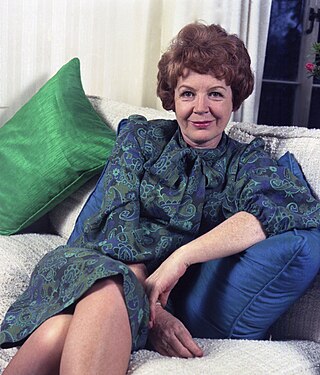
Phyllis Hannah Murray-Hill, known professionally as Phyllis Calvert, was an English film, stage and television actress. She was one of the leading stars of the Gainsborough melodramas of the 1940s such as The Man in Grey (1943) and was one of the most popular movie stars in Britain in the 1940s. She continued her acting career for another 50 years.
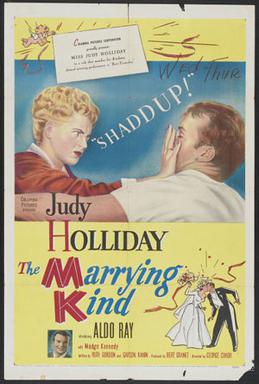
The Marrying Kind is a 1952 American comedy drama film directed by George Cukor and starring Judy Holliday and Aldo Ray. Other cast members include John Alexander, Charles Bronson, Peggy Cass, Barry Curtis, Tom Farrell, Frank Ferguson, Ruth Gordon, Gordon Jones, Madge Kennedy, Nancy Kulp, Mickey Shaughnessy, and Joan Shawlee.
AFI's 100 Years...100 Stars is the American Film Institute's list ranking the top 25 male and 25 female greatest screen legends of American film history and is the second list of the AFI 100 Years... series.

Adele Jergens was an American actress.

Mae Clarke was an American actress. She is widely remembered for playing Henry Frankenstein's bride Elizabeth, who is chased by Boris Karloff in Frankenstein, and for being on the receiving end of James Cagney's halved grapefruit in The Public Enemy. Both films were released in 1931.

Day the World Ended is a 1955 independently made black-and-white post-apocalyptic science fiction film, produced and directed by Roger Corman, that stars Richard Denning, Lori Nelson, Adele Jergens, Paul Birch (actor) and Mike Connors. Chet Huntley of NBC, later of The Huntley-Brinkley Report, served as the film's narrator. It was released by American Releasing Corporation as a double feature with The Phantom from 10,000 Leagues.
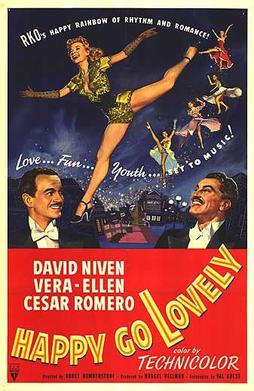
Happy Go Lovely is a 1951 British musical comedy film in Technicolor, directed by H. Bruce Humberstone and starring Vera-Ellen, David Niven, and Cesar Romero. The film was made and first released in the UK, and distributed in the US by RKO Radio Pictures in 1952.
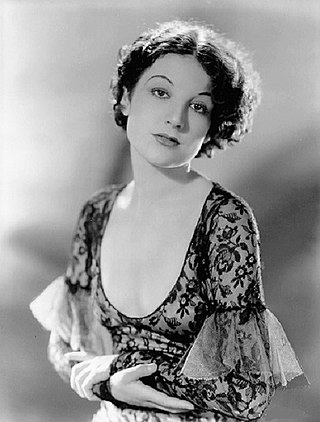
Phyllis Barry was an English film actress. Born in Leeds, West Riding of Yorkshire, England, to Seth Henry and Bertha Hillyard, Barry appeared in over 40 films between 1925 and 1947.

Joan Taylor was an American television and film actress.

Latin Lovers is a Technicolor 1953 romantic musical comedy film made by MGM. It was directed by Mervyn LeRoy, and written by Isobel Lennart. The music score is by Nicholas Brodszky, and the cinematographer was Joseph Ruttenberg.

Apache Woman is a 1955 American Western directed by Roger Corman and starring Lloyd Bridges. It was Corman's second film as director, following Five Guns West. It was one of four Westerns he made for American International Pictures, the other being Five Guns West, The Oklahoma Woman (1955) and Gunslinger (1956). Corman says Apache Woman and Oklahoma Woman were from ideas by AIP whereas the others were his ideas. This was the first film from Golden State Productions, a company headed by Alex Gordon.

The Oklahoma Woman is a 1956 American Western film directed by Roger Corman.

Women's Prison is a 1955 American film noir crime film directed by Lewis Seiler and starring Ida Lupino, Jan Sterling, Cleo Moore, Audrey Totter, Phyllis Thaxter and Howard Duff.
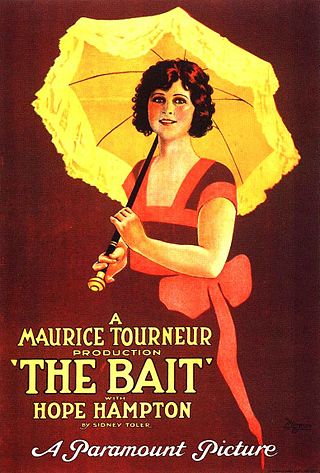
The Bait is a 1921 American silent crime drama film produced by and starring Hope Hampton, directed by Maurice Tourneur, and distributed by Paramount Pictures. John Gilbert, then working for Tourneur, wrote the scenario based on the stage play The Tiger Lady by Sidney Toler. Filmed in 1920, the picture was released a day after New Year's 1921. The Bait is now considered to be a lost film.

Happiness Ahead is a 1934 American comedy film directed by Mervyn LeRoy and starring Dick Powell with Josephine Hutchinson. This was Hutchinson's (credited) debut.

Michael Shayne, Private Detective is a 1940 American mystery film directed by Eugene Forde and starring Lloyd Nolan, Marjorie Weaver and Joan Valerie. It is based on Brett Halliday's novel The Private Practice of Michael Shayne. It was the first in a series of Michael Shayne films starring Nolan.

Girl in 313 is a 1940 American drama film directed by Ricardo Cortez and written by Barry Trivers and M. Clay Adams. The film stars Florence Rice, Kent Taylor, Lionel Atwill, Kay Aldridge, Mary Treen and Jack Carson. The film was released on May 31, 1940, by 20th Century Fox.

Phyllis Avery was an American actress.

















